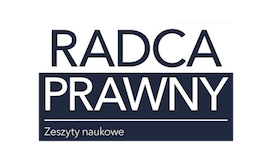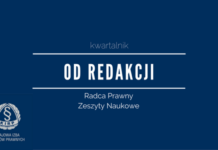We came up with the idea of a special issue of the magazine last year, when we began preparations for the 40th anniversary of the National Bar of Attorneys-at-Law. This is, undoubtedly, the opportune moment for our journal to feature articles about the challenges facing the profession of the attorney-at-law and the Bar. I had the honour to coordinate the works on publishing the special issue – a task that did not prove too difficult, as the vast majority of people who, in my view, should voice their opinions in discussing both our profession and the condition and future of the Bar, kindly accepted the invitation.
The special issue of the journal contains 14 scientific articles and a gloss. The goal of the first of the articles, “Lawyer as Interpreter. On the Metaphorical Understanding of the Expert Nature of the Legal Profession” by Paweł Skuczyński, is to clarify the nature of the legal profession as an expert profession. In particular, it attempts to address the question of the social role of legal profession that requires the application of abstract knowledge to solve specific problems. The articles starts off with social theories that see this role as mediating and integrating the social structure. Next, using the methodology of cognitive metaphor, this characterization is further developed by being juxtaposed with another type of expert activity. Additionally, the article points to practical problems in the work of a lawyer related to mediating between abstract knowledge of the law and solving individual legal problems in the social structure.
Marcin Matczak, in the article titled “The Language of Legal Populism – a Philosophical and Legal Perspective” explains the change in legal culture defined as a set of linguistic and behavioural conventions relevant to the law, as carried out by populist circles. The main idea of the article is that the populist change of legal culture consists in turning legally significant concepts into empty or constantly changing ideas, and in destroying legal conventions with a series of instruments. The conducted analysis offers conclusions on how to counter the populist shift in legal culture.
In the third article of the special issue titled “Tasks of the National Bar of Attorneys-at-Law in the Light of Article 17(1) of the Constitution of the Republic of Poland”, the author Sławomir Patyra argues that the provision of legal assistance by attorneys-at-law in Poland, as a democratic legal state that protects human freedoms and rights, is an essential element that determines the legal position and detailed systemic functions not only of attorneys-at-law themselves, but also of the Bar that unites them. Thus, the Bar, which is the only formula for organizing attorneys-at-law that is allowed, constitutes sui generis an element of the system of the Republic of Poland based on the idea of the primacy of the Constitution in the system of sources of law, as well as on the principle of legalism, which sets limits to the actions that may be undertaken by public authorities.
In the article titled “The Mission of the National Bar of Attorneys-at-Law and its Members” Rafał Stankiewicz stresses that the elements which define the mission of the Bar and the mission of the attorney-at-law are determined by the goals which had been set for the profession of the attorney-at-law, namely the participation in the system of justice and support for a democratic rule of law. In Article 17, the Basic Law imposes an obligation on self-governments of the professions in which the public repose confidence to harmoniously combine multiple functions. The professional self-government is not only supposed to shape the interests of professionals in whom the public repose confidence, but, above all, aim to align them with the public interest.
In the article titled “The Role of Attorneys-in-Law in a Democratic Rule of Law”, the author Mariusz Wieczorek argues that the systemic role of attorneys-in-law in Poland is reflected in the provisions of the Constitution of the Republic of Poland and the provisions of the Act on Attorneys-at-Law. These provisions form a coherent mechanism that should guarantee attorneys-at-law and their Bar, a real impact on the degree of implementing the constitutional principle of a democratic rule of law. When acting as a legal representative, when preparing opinions for the purpose of application of law by a public administration body, or expert opinions in a legislative process, an attorney-at-law should bear in mind that they are performing a profession in which the public repose confidence, which has been assigned a special significance by the legislator, far beyond the ordinary gainful activity. The article provides a number of important directions for attorneys-at-law.
The basic elements that define a profession of public trust, exemplified by an attorney-at-law, are addressed by Tomasz Niedziński in his article titled “Professional Secrecy in Attorneys-at-Law and their Independence”. The article addresses such elements as the need to maintain professional secrecy, and the need to take into account the principles of professional deontology in the course of provision of legal assistance by an attorney-at-law. The author discusses a number of aspects with regard to the application of legal regulations on maintaining professional secrecy in the context of the applicability of the Code of Ethics for the Attorney-at-Law.
Another article included in the special issue, by Alexander Jakubowski, entitled “The Status of the National Bar of Attorneys-at-Law in the Light of the Code of Administrative Procedure – from the Perspective of Handling Complaints, Motions and Petitions” refers to the status of the bodies of the Bar as public administration bodies in a functional perspective, and the necessity of implementing legal regulations that define the manner in which administrative bodies operate, e.g. the provisions on handling complaints and motions contained in the Code of Administrative Procedure.
In the article entitled “Participation in Capital Companies as a Form of Practising the Profession of the Attorney-at-Law”, Bogusław Sołtys takes up the topical discussion of involving capital companies in the catalogue of tasks handled by an attorney-at-law. We consider this publication as an important contribution in the development of the Bar’s position in this regard.
In the article entitled “Change of Profession or the Manner of its Performance from the Perspective of Professional Ethics of Attorneys-at-Law”, the author Sławomir W. Ciupa addresses issues related to professional mobility of the attorney-at-law in the light of the principles included in the Code of Ethics of the Attorney-at-Law. The author discusses changing the occupation or the manner it is performed in terms of the transition from the public to the private sector, from the private sector to the public sector and within the private sector. Although these phenomena are partly standardised, they legally escape ethical regulation. The author analyses whether the application of the above ethical principles is sufficient from the point of view of safeguarding against unethical use of relationships or relationship networks from the professional past, as well as avoiding the associated reduction of independence, conflicts of interest, violation of professional secrecy or loyalty.
The practical issue of significance related to the profession of running a law firm by an attorney-at law who is taking care of a person with a disability is addressed by Katarzyna Małysa-Sulińska and Marcin Wujczyk in the article entitled “The Suspension of the Activity of Running a Law Firm by Attorneys-at-Law Taking Care of a Person with a Disability”. The article addresses an array of aspects related to implementing the duties of an Attorney-at-Law as an entrepreneur who runs a law firm in connection with the care of people with disabilities.
In another article entitled “On the Non-Constitutionality of the Rules of Remuneration for Attorneys-at-Law who Provide Court-Assigned Legal Assistance and the Resulting Legal Consequences”, Monika Florczak-Wątor addresses problems related to the construction of normative regulations regarding the creation and implementation of regulations on remuneration to attorneys-at-law who provide court-assigned legal assistance. The author’s remarks are in connection with the interpretation of the provisions of the Basic Law. It was pointed out in the aforementioned text that the variation of salaries between court-assigned attorneys and attorneys of choice for the same activities undertaken as a provision of legal assistance, raises a certainty that this solution is non-constitutional. Delegated legislation allows courts to disregard these norms and set the amount of salaries of court-assigned attorneys on the basis of the rules for determining the remuneration of an attorney of choice. Judicial rulings are already moving in this direction, but this does not override the Minister of Justice’s obligation to amend the constitutionally flawed regulations.
Related to the previous article is the text by Piotr Rylski entitled “Adjudication with Regard to the Remuneration of Court-Assigned Representatives in Civil Proceedings – de lege ferenda remarks”. The author notes the need to undertake urgent changes with regard to the adjudication and payment of remuneration and reimbursement to attorneys. Otherwise, the provision of services by court-assigned attorneys will be a risky activity for them and, above all, will affect the quality of the assistance provided to the people to whom it is due. In the author’s opinion, these changes should be consistent with European trends, i.e. the introduction of the principle of the Treasury’s full liability for these expenses. In the author’s opinion, it is necessary to introduce a regulation to rule the immediate payment of the costs due to the court-assigned attorney, as is currently the case with the remuneration due to witnesses, experts or interpreters.
In another article included in the special issue, entitled “The Right to a Defence Counsel in the Light of the Rulings by the European Court of Human Rights” the author Jarosław Zagrodnik discusses the actual manner of implementing the court’s rulings in shaping domestic legislation regarding the participation of defence counsels in criminal proceedings. The author is highly critical of the regulation of this right in Polish law at the stage of directing criminal prosecution against a specific person.
The last of the articles in the issue, entitled “Representation of a Party by a Professional Attorney in Administrative Court Proceedings” by Wojciech Piątek raises a number of important and yet hitherto not discussed issues related to the participation of professional attorneys in proceedings before administrative courts. In particular, a reference was made to the scope of the necessity with which lawyers and attorneys-at-law must determine, before the Supreme Administrative Court, the consequences of misconduct by a professional attorney for the sphere of rights and obligations of the represented entity. It also outlines the challenges that professional attorneys and their self-government bodies are faced with today.
The special issue is concluded with a partially critical gloss to the ruling of the Supreme Administrative Court of 6 May 2021, II GSK 1057/20 by Piotr Rączka and Karolina Rokicka-Murszewska.
This special issue of the journal has an increased volume on this occasion, which results from the fact that we decided to publish it in two languages (also in English). We do believe that our friends affiliated in legal professional corporations in various countries of the European Union will find it interesting. We have been long receiving signs of interest, kindness and concern from them, in connection with the current situation in the Polish system of justice. Our anniversary is a perfect occasion for showcasing the problems and challenges that attorneys-at-law, as well as the strong and consolidated Bar that brings them all together, are currently facing.
Rafał Stankiewicz
scientific editor of the issue



